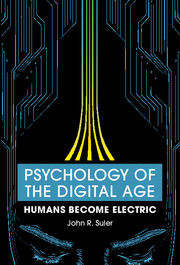Book contents
- Frontmatter
- Dedication
- Contents
- List of Figures
- Foreword
- Preface
- Acknowledgments
- Introduction: Newborns in Evolution
- 1 Cyberpsychology Architecture
- 2 Presence: Be Here Now
- 3 The Dynamic Digital Psyche
- 4 The Disinhibited Self
- 5 Electrified Relationships
- 6 Other Than You Think: Interpersonal Perceptions
- 7 Text Talk
- 8 Image Talk
- 9 I, Avatar
- 10 One of Us: Groups and Communities
- 11 Change and Excess
- 12 Addicted or Devoted
- 13 The Digital Deviant
- 14 Synthesized Realities and Synthesized Beings
- 15 Electric Th erapeutics
- Conclusion: Research and the Researcher
- References
- Index
15 - Electric Th erapeutics
Published online by Cambridge University Press: 05 November 2015
- Frontmatter
- Dedication
- Contents
- List of Figures
- Foreword
- Preface
- Acknowledgments
- Introduction: Newborns in Evolution
- 1 Cyberpsychology Architecture
- 2 Presence: Be Here Now
- 3 The Dynamic Digital Psyche
- 4 The Disinhibited Self
- 5 Electrified Relationships
- 6 Other Than You Think: Interpersonal Perceptions
- 7 Text Talk
- 8 Image Talk
- 9 I, Avatar
- 10 One of Us: Groups and Communities
- 11 Change and Excess
- 12 Addicted or Devoted
- 13 The Digital Deviant
- 14 Synthesized Realities and Synthesized Beings
- 15 Electric Th erapeutics
- Conclusion: Research and the Researcher
- References
- Index
Summary
Technology is teaching us to be human again.
– Simon MainwaringEliza: Hello, I am Eliza.
John: Hello, I am John.
Eliza: Did you come to me because you are John?
John: I came to find out about your being a computerized therapist.
Eliza: Why are you concerned about my being a computerized therapist?
John: I wanted to find out about how effective you might be.
Eliza: Oh … might be?
John: Do you think you help people with problems?
Eliza: You're not really talking about me, are you?
John: Do you think you can help me?
Eliza: We were discussing you, not me.
John: Sometimes I need help with stress.
Eliza: I'm not sure I understand you fully.
John: When I get very stressed, I need a good way to relax, to take my mind off things.
Eliza: Why do you ask?
John: Because I thought you might help me with that problem.
Eliza: You're not really talking about me, are you?
John: I'm talking about myself, about getting help with stress.
Eliza: Do you believe it normal to be talking with yourself, about getting help with stress?
John: This is starting to get frustrating.
Eliza: I see.
John: I would like to get help coping with stress.
Eliza: I'm not sure I understand you fully.
John: I'm beginning to think that you don't understand much at all.
Eliza: Did you come to me because you are beginning to think that me don't understand much at all?
John: I think I already found out what I need to know. Goodbye.
Eliza: Have you asked such questions before?
Many of the mental health professionals who first went online were specifically interested in the idea of conducting psychotherapy in cyberspace. They proposed different terms for it – such as e-therapy, cyber-therapy, and computer-mediated therapy – but they all shared the same basic question: is it possible to do effective clinical work online, and if so, how? In the decades since then, the conclusion has been “yes,” with a variety of different strategies employed, such as email therapy, chat therapy, text messaging for therapists to stay in contact with clients during their everyday living, and even the setting up of psychotherapy practices in virtual worlds using avatars for both the client and therapist.
- Type
- Chapter
- Information
- Psychology of the Digital AgeHumans Become Electric, pp. 380 - 416Publisher: Cambridge University PressPrint publication year: 2015



